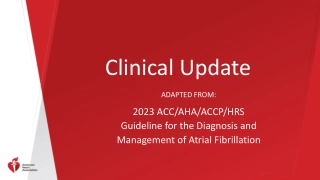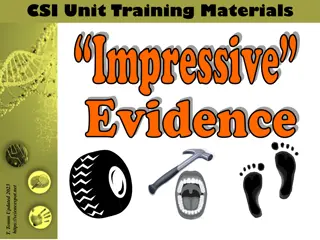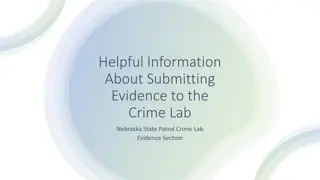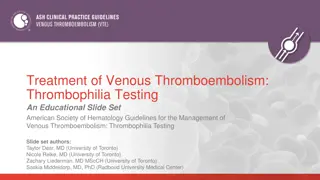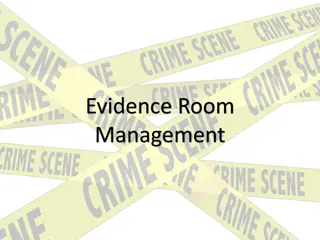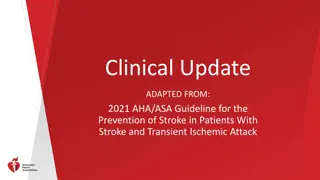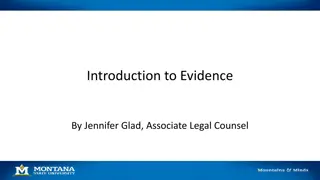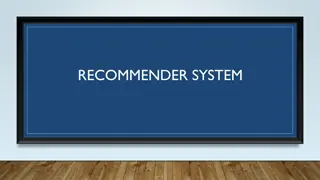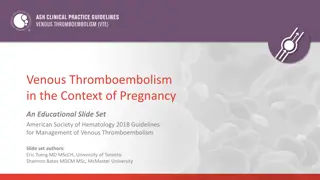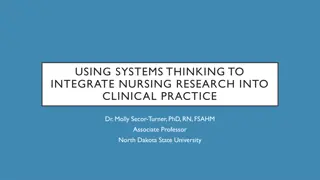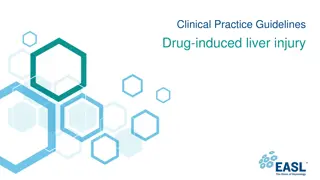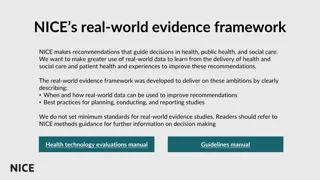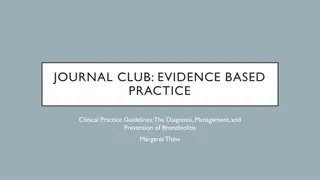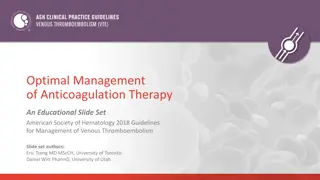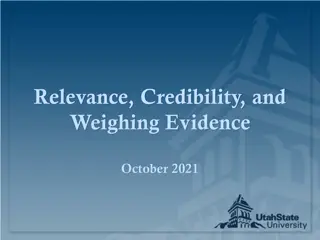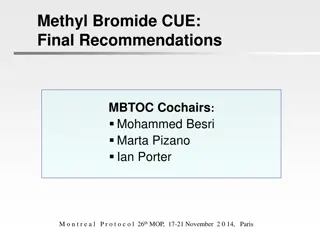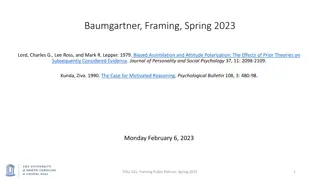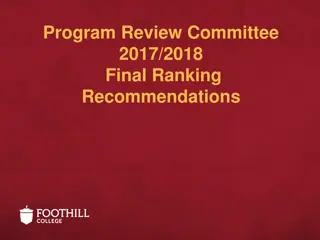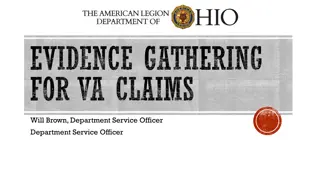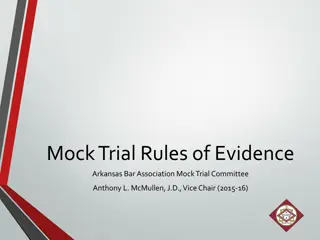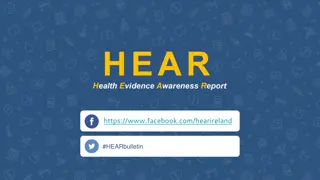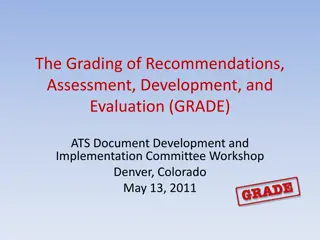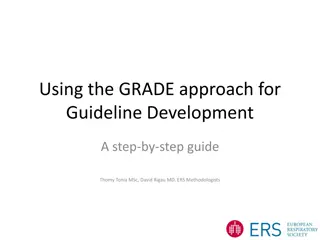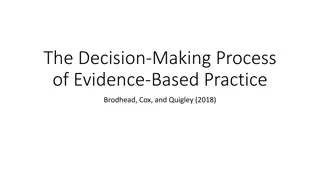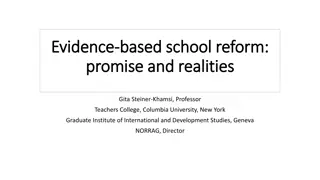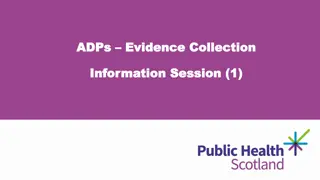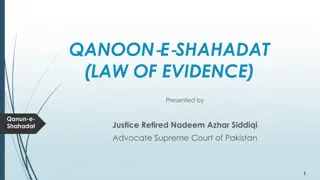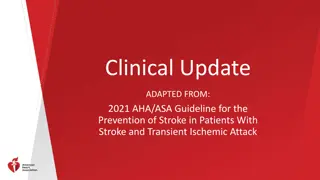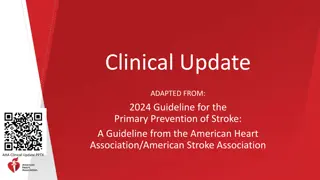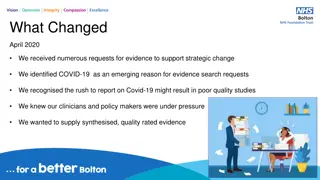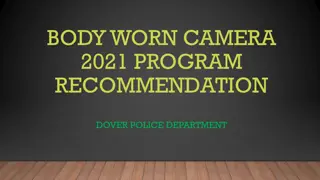Clinical Update
This clinical update presents the 2023 ACC/AHA/ACCP/HRS guideline for diagnosing and managing atrial fibrillation. It categorizes recommendations based on class of recommendation and level of evidence, ranging from strong to weak. Recommendations are supported by high-quality evidence from randomize
3 views • 46 slides
The Role of Artifacts and Evidence in Educator Evaluation and Support
Exploring the role of artifacts and evidence in educator evaluation, this content covers the three categories of evidence required by the Oregon Framework. It delves into the efficient process that reduces redundancy, essential components of SLG goals, and the types of evidence relevant to professio
0 views • 15 slides
Impression Evidence Collection in CSI Investigations
Impression evidence plays a crucial role in investigations, including shoeprints, tool marks, tire tracks, bite marks, and riffling marks on bullets. This evidence can be collected in 2D using photography or tape lifts, and in 3D through casting methods. Differentiating between class and individual
0 views • 21 slides
Helpful Information About Submitting Evidence to the Crime Lab.
Helpful information about submitting evidence to the Nebraska State Patrol Crime Lab's Evidence Section. Learn about the NSP 750 Evidence Submittal Form, submission process, and guidelines for resubmissions. Ensure all necessary details are provided for proper analysis of evidence.
5 views • 16 slides
Illegally obtained evidence
Illegally obtained evidence refers to evidence acquired through unlawful means, such as searches without warrants or extraction under duress. The Fruit of the Poisonous Tree doctrine renders evidence inadmissible if derived from illegally obtained evidence. The Exclusionary Rule prohibits the use of
2 views • 30 slides
Guidelines for Thrombophilia Testing in Venous Thromboembolism Management
The American Society of Hematology (ASH) provides comprehensive guidelines for the management of venous thromboembolism (VTE) with a focus on thrombophilia testing. Expert panels develop recommendations based on clinical questions, evidence synthesis, and resource use. These guidelines cover various
2 views • 47 slides
Clinical Update
This clinical update provides recommendations for the diagnosis and management of atrial fibrillation adapted from the 2023 ACC/AHA/ACCP/HRS guidelines. It includes information on class strength of recommendations, levels of evidence, and phrases for writing recommendations based on the quality of e
1 views • 46 slides
Evidence Room Management
Explore the intricacies of evidence room management in a law enforcement setting, including the roles of individuals like Greg Van Buskirk, differences in crime scene management between large and small departments, the distinction between property and evidence, the importance of maintaining chain of
0 views • 8 slides
Clinical Update: 2021 AHA/ASA Guideline for Stroke Prevention
This clinical update provides guidance adapted from the 2021 AHA/ASA Guideline for the Prevention of Stroke in Patients with Stroke and Transient Ischemic Attack. It categorizes recommendations based on strength and quality of evidence, outlining levels of recommendation and evidence for different c
4 views • 43 slides
Evidence in Investigations
Learn about the principles and types of evidence in investigations, including inculpatory and exculpatory evidence, physical, documentary, demonstrative, and verbal evidence. Explore sources of evidence and the significance of collecting relevant information to ensure a fair investigative process.
0 views • 14 slides
Different Types of Recommender Systems
Recommender systems play a crucial role in providing personalized recommendations to users. This article delves into various types of recommender systems including Collaborative Filtering, Content-Based, Knowledge-Based, and Group Recommender Systems. Collaborative Filtering involves making predicti
1 views • 7 slides
Context Evidence in Legal Proceedings
Context evidence in legal proceedings refers to evidence of acts not charged in the indictment, used to provide a background for understanding specific allegations. This type of evidence is often relied upon by the prosecution to explain events or behaviors that may seem isolated or surprising. It i
1 views • 13 slides
ASH Guidelines on Venous Thromboembolism in Pregnancy
The American Society of Hematology (ASH) 2018 guidelines provide comprehensive management recommendations for venous thromboembolism in pregnancy. Key aspects include panel formation, clinical questions generation, evidence synthesis, and making recommendations. The guidelines offer strong and condi
0 views • 49 slides
Integrating Nursing Research into Clinical Practice with Systems Thinking
Dr. Molly Secor-Turner emphasizes the importance of evidence-based practice (EBP) in nursing. EBP, derived from rigorous research, leads to quality patient outcomes by aligning services with current knowledge. The process involves identifying problems, critiquing evidence, implementing recommendatio
0 views • 21 slides
EASL Clinical Practice Guidelines for Drug-Induced Liver Injury Management
These slides provide an in-depth overview of the EASL clinical practice guidelines on managing drug-induced liver injury. The guidelines cover epidemiology, key recommendations, future prospects, new biomarkers, unresolved issues, and unmet needs. Recommendations are based on evidence levels from th
0 views • 44 slides
Enhancing Recommendations with Real-World Data Framework
NICE's real-world evidence framework aims to utilize data from service evaluations, patient devices, and more to enhance recommendations in health and social care. Real-world evidence analysis can provide insights into patient experiences, technology impacts, and care outcomes, improving decision-ma
0 views • 8 slides
Evidence-Based Guidelines for Bronchiolitis in Children: Diagnosis, Management, and Prevention
Bronchiolitis is a common viral illness in infants characterized by lower respiratory tract inflammation. The American Academy of Pediatrics released updated guidelines in 2015 for children aged 1-23 months, focusing on evidence-based approaches for diagnosis, prevention, and management. The guideli
4 views • 30 slides
Evidence-Based Medicine and Clinical Decision-Making
European Patients Academy on Therapeutic Innovation emphasizes the importance of Evidence-Based Medicine (EBM) in providing optimum clinical care. EBM involves systematic review and utilization of clinical research for informed decision-making, benefiting patients in disease management and treatment
7 views • 20 slides
Optimal Management of Anticoagulation Therapy: ASH 2018 Guidelines
Educational slide sets and clinical guidelines by the American Society of Hematology (ASH) provide recommendations for the management of venous thromboembolism, including the optimal use of anticoagulation therapy. The guidelines detail panel formation criteria, development process, evidence synthes
0 views • 43 slides
Relevance, Credibility, and Weighing Evidence in Decision-Making
Explore the importance of relevance and credibility in evidence assessment, the role of hearing panels in evaluating evidence fairly, and the responsibilities they hold. Learn about presenting relevant evidence, policy analysis, and identifying irrelevant evidence to ensure a thorough review process
6 views • 32 slides
BioCuration Variant Curation Guidelines and Recommendations
BioCuration Working Group's variant curation guidelines by Steven Harrison provide critical flexibility in variant classification, allowing criteria weights to be adjusted based on professional judgment. Recommendations include harmonizing ACMG/AMP guidelines and documenting strength-modified eviden
3 views • 42 slides
Mastering Claims, Evidence, and Warrants for Persuasive Writing
Understanding the concepts of claims, evidence, and warrants is crucial for constructing persuasive arguments. Claims represent positions to persuade, evidence supports claims with facts, and warrants bridge the gap between evidence and claims. An exercise is outlined to help practice forming claims
0 views • 8 slides
Methyl Bromide Usage Recommendations and Reporting Summary
The Methyl Bromide Technical Options Committee (MBTOC) provides final recommendations on the usage of methyl bromide for different sectors and countries based on reported stocks and proposed quantities for various commodities. The recommendations emphasize the importance of justifying the critical n
0 views • 12 slides
Biased Assimilation and Attitude Polarization in Social Disputes
People with strong opinions on complex social issues tend to interpret evidence in a biased manner, accepting confirming evidence readily while subjecting disconfirming evidence to critical evaluation. This can lead to increased polarization rather than narrowing of disagreement when exposed to the
0 views • 20 slides
Transformation of Quality Assessment Framework in Healthcare
The healthcare quality assessment framework is evolving with a new strategy focused on data-led, people's experiences, care integration, and safety culture. The current framework is transitioning towards a new approach by late 2023, incorporating separate registration and monitoring processes, five
0 views • 14 slides
Program Review Committee 2017/2018 Final Ranking Recommendations
The Program Review Committee for 2017/2018 has finalized its recommendations based on rankings and meetings with various departments. Issues such as enrollment declines, productivity issues, and equity concerns were highlighted. The rankings of programs were color-coded into green, yellow, and red c
0 views • 10 slides
Evidence Gathering for VA Claims with The American Legion Department of Ohio
Evidence is crucial for VA claims, and it can come in various forms such as documents, written statements, photos, and video recordings. The framework for evaluating evidence includes factors like relevance, competence, credibility, and weight. Understanding the types of evidence, forms of relevance
0 views • 14 slides
Mock Trial Rules of Evidence
Mock Trial Rules of Evidence are crucial for determining the admissibility of testimony and evidence in a trial setting. Students preparing for cases need to assess evidence admissibility, make timely objections, and be prepared to defend testimony. The rules cover objections, specific objections ty
0 views • 36 slides
Collaborative Efforts of Irish Health Librarians in Providing Evidence-Based Practice Support
Current awareness newsletter freely available on the internet, providing high-quality, relevant information to healthcare professionals and consumers. This collaboration of Irish health librarians aims to promote evidence-based practice by offering up-to-date information and resources. The conscient
0 views • 12 slides
The GRADE Approach in Evidence-Based Practice
Exploring the GRADE approach for evidence evaluation involves formulating questions, determining outcomes, conducting literature reviews, estimating intervention effects, and grading recommendations based on evidence quality. Step by step guidance is provided, including using the PICO format for que
0 views • 60 slides
Practice and Procedure in Judicial Review: Factual Evidence and Interveners
The content provides valuable insights into the practice and procedure regarding factual evidence and interveners in judicial review cases. It covers general rules, recent cases, applications for oral evidence, questioning witnesses, opinion evidence, and the role of interveners. Key points include
0 views • 28 slides
Step-by-Step Guide to Using the GRADE Approach for Guideline Development
This step-by-step guide outlines the process of utilizing the GRADE approach for developing guidelines in healthcare. It covers key stages such as formulating questions using the PICO format, selecting and rating outcomes of interest, conducting a systematic review, grading evidence, and translating
0 views • 23 slides
Evidence-Based Practice in Behavior Analysis
Definitions and analogies from the field of medicine help clarify the concept of Evidence-Based Practice (EBP) in Behavior Analysis. EBP involves integrating current best evidence with clinical expertise and client values to make informed decisions. The three-legged stool analogy illustrates the imp
0 views • 32 slides
Structural Coupling between Science and Politics in Evidence-Based School Reform
This article by Gita Steiner-Khamsi explores the interplay between science and politics in evidence-based school reform, focusing on global public goods and the use of data and evidence in policy planning. It discusses the challenges and promises of evidence-based approaches, highlighting the comple
0 views • 17 slides
Evidence Collection Process for MAT Services
The Evidence Collection Process for MAT Services involves three main stages: Planning, Collecting & Submitting. The process includes gathering evidence related to Process, Numerical, and Experiential aspects, based on RAG status indicators. The RAG status categorizes implementation levels across MAT
0 views • 6 slides
Qanun-e-Shahadat: Law of Evidence in Pakistan
Qanun-e-Shahadat Order 1984 replaced the Evidence Act of 1872 in Pakistan, aiming to align the law of evidence with Islamic principles. This law is crucial for judicial proceedings, governing the admissibility of oral and documentary evidence, primary and secondary evidence, and resolving conflicts
0 views • 22 slides
2021 AHA/ASA Guideline for Stroke Prevention in Patients with Stroke and TIA
This clinical update provides recommendations based on the 2021 AHA/ASA Guideline for Stroke Prevention in patients with stroke and transient ischemic attack (TIA). Recommendations are classified based on the strength of evidence and quality, guiding healthcare professionals on optimal clinical stra
1 views • 43 slides
Guideline for Primary Prevention of Stroke: Clinical Update 2024
This clinical update presents guidelines for the primary prevention of stroke based on the 2024 American Heart Association/American Stroke Association guidelines. It outlines different classes of recommendation levels and the quality of evidence supporting various clinical strategies, interventions,
0 views • 37 slides
Enhancing Evidence Synthesis for COVID-19 Impact
Addressing the surge in evidence requests post April 2020 due to COVID-19, a simplified Three Tier evidence scale was developed to ensure quality grading. Providing clinicians with readily available, quality-rated evidence, this system streamlines the search process and aids in quick decision-making
0 views • 4 slides
Dover Police Body Worn Camera 2021 Program Recommendations
The Dover Police Department's program recommendation for implementing body-worn cameras highlights the importance of transparency, accountability, and evidentiary proof in policing. The document discusses the background of adopting emerging technologies in law enforcement, evaluates existing vendors
0 views • 26 slides
